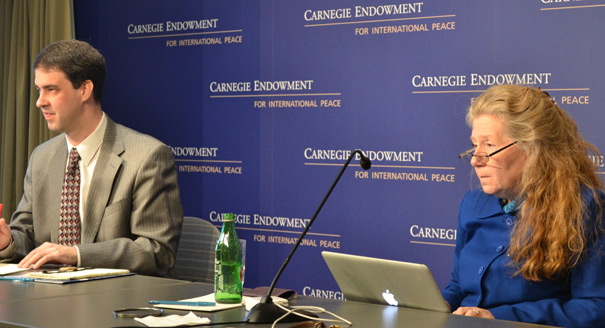Registration
You will receive an email confirming your registration.
China’s relations with the developing world are based on what China calls “South-South, win-win complementarity.” Many countries in these regions are rich in resources China needs to fuel its rapid growth, while in turn China provides abundant financing, investment and affordable exports. China’s "Peaceful Development" foreign policy claims that such complementarity naturally leads to harmonious, peaceful political outcomes.
Carnegie’s Matt Ferchen discussed China’s peaceful development policy with regard to resource-rich Latin American countries and explored the ways in which Chinese and U.S. foreign policy should promote a positive role for both countries in the developing world. Cynthia Watson of the National Defense University moderated.
China: Realist or Liberal?
- Conventional Wisdom: Most observers view China’s foreign policy as eminently realist, Ferchen said. China is perceived as a realist actor from historical, cultural, and strategic perspectives, and its recent behavior in the South and East China Seas emphasizes this perception, he explained.
- Liberal Policy: But in stark contrast to this conventional wisdom, Ferchen said, China has also adopted a very liberal foreign policy of peaceful development. The peaceful development policy framework is marked by key liberal concepts like “win-win” relations, mutually beneficial ties, and complementarity in foreign policy, he said.
- South-South Relations: China’s foreign policy attaches much importance to South-South relations. China sees itself as a resource-scarce developing country, Ferchen said, while its developing country partners are often resource-rich—an arrangement that Beijing believes will lead to mutually complementary, harmonious, and stable political and economic outcomes.
Problems With Peaceful Development
- Appeal of Complementarity: Beijing has adopted a policy of peaceful development for pragmatic reasons, including appealing to existing global liberal norms and preempting concerns about China’s rise, and for ideological ones, including its historical identity as a moral and peaceful country and feelings of solidarity with developing countries, Ferchen said.
- Growing Tensions: But Ferchen explained that China’s resource-rich developing country partners are not all pleased with “win-win complementarity.” These partners are increasingly calling for ties with China to move beyond complementarity, he said. Brazil, Myanmar, Zambia, Argentina, Chile, and even Australia are some resource-rich countries concerned about rising dependency on China, a less-diversified economic base, and challenges to their export competitiveness, Ferchen said.
- SOEs Behaving Badly: Liberal governance of China’s state-owned enterprises has also created political risk for Beijing, Ferchen explained. Deals between Chinese state-owned enterprises or state banks and oil countries and pariah states such as Myanmar, Iran, Sudan, and Venezuela are not necessarily benefiting Beijing’s long-term strategic interests, he said. State enterprises are seen as acting at the behest of the government, even when they may be responding more to profit motivations, he continued.
Implications of Foreign Policy Liberalism
- Policy Disconnect: While China is perceived as a realist, both its foreign policy rhetoric and the behavior of Chinese companies abroad are too liberal, Ferchen concluded. China, the United States, and developing countries should recognize the complications and problems embedded in China’s liberal peaceful development policy. He added that China must also address the disconnect between its liberal rhetoric and the actions of state-owned enterprises doing business abroad.
- Improving Oversight and Research: Better governance of state banks and enterprises is needed, Ferchen argued. Meanwhile, Beijing should also consider the foundations of political and economic stability in countries where it is doing business—an area where there is room for dialogue with the United States, he said. And within China, Ferchen recommended more scholarly focus on less-understood areas like Latin America that are becoming important strategic partners.
